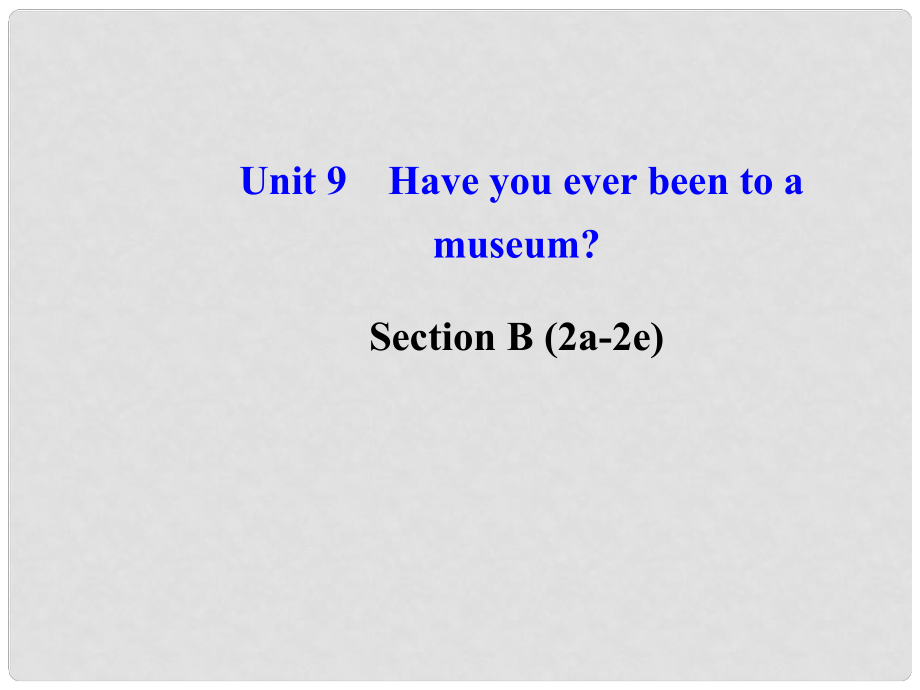《八年級(jí)英語(yǔ)下冊(cè) Unit 9 Have you ever been to a museum Section B (2a2e)課件 (新版)人教新目標(biāo)版》由會(huì)員分享�����,可在線閱讀�,更多相關(guān)《八年級(jí)英語(yǔ)下冊(cè) Unit 9 Have you ever been to a museum Section B (2a2e)課件 (新版)人教新目標(biāo)版(16頁(yè)珍藏版)》請(qǐng)?jiān)谘b配圖網(wǎng)上搜索。
1�����、 Unit 9Have you ever been to a museum? Section B (2a-2e) . 短語(yǔ)互譯短語(yǔ)互譯1. 數(shù)以千計(jì)的數(shù)以千計(jì)的; 許許多多的許許多多的 2. 一個(gè)說英語(yǔ)的國(guó)家一個(gè)說英語(yǔ)的國(guó)家 3. 在白天在白天 4. all year round 答案答案: 1. thousands of2. an English-speaking country3. during the daytime4. 全年全年. 句型展示句型展示1. 一方面一方面, 四分之三以上的人口是華人四分之三以上的人口是華人, 因此很多時(shí)候你可以因此很多時(shí)候你可以只說普通話����。只說普通話。_ _
2��、 _ _, more than _ _ _ the population are Chinese, so you can simply speak Putonghua a lot of the time. 答案答案: : On the one hand; three quarters of2. 另一方面另一方面, 新加坡是一個(gè)說英語(yǔ)的國(guó)家新加坡是一個(gè)說英語(yǔ)的國(guó)家, 因此它也是一個(gè)練因此它也是一個(gè)練習(xí)英語(yǔ)的好去處習(xí)英語(yǔ)的好去處! _ _ _ _, Singapore is an English-speaking country, so its also a good place _ _ your
3����、 English! 3. 你會(huì)不費(fèi)吹灰之力買到米飯、面條或者水餃�。你會(huì)不費(fèi)吹灰之力買到米飯、面條或者水餃����。You wont_ _ _getting rice, noodles or dumplings. 答案答案: : 2. On the other hand; to practice3. have any problem4. 不管你喜歡印度食品不管你喜歡印度食品, 西方食品西方食品, 還是日本食品還是日本食品, 在新加坡在新加坡你都能找得到你都能找得到! _you like Indian food, Western food _ Japanese food, youll find it al
4�、l in Singapore! 5. 因此你可以選擇你喜歡的任何時(shí)間去��。因此你可以選擇你喜歡的任何時(shí)間去���。So you can choose to go _ _ _. 答案答案: : 4. Whether; or5. whenever you like1. For thousands of tourists from China, this small island in Southeast Asia is a wonderful and safe place to take a holiday. 對(duì)于許許多多的中國(guó)游客來(lái)說對(duì)于許許多多的中國(guó)游客來(lái)說, 這個(gè)東南亞的小島是一個(gè)又好這個(gè)東南亞的小
5、島是一個(gè)又好又安全的度假地���。又安全的度假地��?��!咀灾黝I(lǐng)悟自主領(lǐng)悟】(1)thousand意為意為“千千”, 當(dāng)和其他數(shù)詞連用表示當(dāng)和其他數(shù)詞連用表示具體數(shù)字時(shí)不加具體數(shù)字時(shí)不加s。例如����。例如: two thousand students兩千名學(xué)生。兩千名學(xué)生����。(2)thousand和和of連用表籠統(tǒng)數(shù)時(shí)必須加連用表籠統(tǒng)數(shù)時(shí)必須加s, 構(gòu)成構(gòu)成thousands of意意為為“數(shù)以千計(jì)的數(shù)以千計(jì)的; 許許多多的許許多多的”?����!净顚W(xué)活用活學(xué)活用】 這個(gè)村莊大約有三千人口。這個(gè)村莊大約有三千人口���。There are about people in this village. 答案答案: : three
6��、 thousandEvery year, students leave this school. A. two thousands B. two thousands ofC. thousand of D. thousands of2. Maybe you fear that you wont be able to find anything good to eat when you travel. 或許你會(huì)害怕旅行時(shí)找不到好的東西吃����?����;蛟S你會(huì)害怕旅行時(shí)找不到好的東西吃��?����!咀灾黝I(lǐng)悟自主領(lǐng)悟】 句中句中fear用作及物動(dòng)詞用作及物動(dòng)詞, 意為意為“害怕害怕; 懼怕懼怕”���。后跟����。后跟that引引導(dǎo)的
7、賓語(yǔ)從句����。例如導(dǎo)的賓語(yǔ)從句。例如: Some students fear that they cant learn English well. 有些學(xué)生害怕學(xué)不好英語(yǔ)�����。有些學(xué)生害怕學(xué)不好英語(yǔ)�?���!練w納拓展歸納拓展】fear的不同搭配的不同搭配(1)fear to do sth. 害怕做某事。例如害怕做某事����。例如: The girl fears to go out at night. 這個(gè)女孩害怕晚上出門。這個(gè)女孩害怕晚上出門����。(2)fear for sb. /sth. 為為擔(dān)心擔(dān)心; 為為擔(dān)憂。例如擔(dān)憂���。例如: Police fear for the lost children. 警察為丟失的孩
8�����、子們擔(dān)憂��。警察為丟失的孩子們擔(dān)憂��?�!净顚W(xué)活用活學(xué)活用】 我們擔(dān)心我們會(huì)在森林里迷路���。我們擔(dān)心我們會(huì)在森林里迷路���。We we will get lost in the forest. Some students fear (speak) in front of the class. 答案答案: fear thatto speak3. Whether you like Indian food, Western food or Japanese food, youll find it all in Singapore! 不管你喜歡印度食品不管你喜歡印度食品, 西方西方食品食品, 還是日本食品還是日本
9、食品, 在新加坡你都能找得到在新加坡你都能找得到! 【自主領(lǐng)悟自主領(lǐng)悟】 句中句中whether用作連詞用作連詞, 意為意為“不管不管(還是還是); 或或者者(或者或者)”, 常用結(jié)構(gòu)有常用結(jié)構(gòu)有: whether. . . or. . . 連接兩個(gè)并連接兩個(gè)并列主語(yǔ)��、短語(yǔ)或句子��。例如列主語(yǔ)�、短語(yǔ)或句子。例如: The trip, whether by bus or train, takes less than five hours. 不管坐公共汽車還是火車不管坐公共汽車還是火車, 旅行都用不著旅行都用不著5個(gè)小時(shí)�。個(gè)小時(shí)。Whether it is easy or it is difficu
10��、lt, we wont give up. 不管容不管容易還是困難易還是困難, 我們都不會(huì)放棄��。我們都不會(huì)放棄?����!净顚W(xué)活用活學(xué)活用】 不管成功還是失敗不管成功還是失敗, 我們都必須盡力而為���。我們都必須盡力而為��。we succeedfail, we have to try our best. 答案答案: : Whether; or. 用所給詞的適當(dāng)形式填空用所給詞的適當(dāng)形式填空1. We have seen some(India) movies. 2. Guilin is a good place(take) a holiday. 3. You wont have any problem(get)
11�、 help from others in our hometown. 4. You can(simple) dance on the stage(舞臺(tái)舞臺(tái)). 5. He bought a(Japan) car last year. 答案答案: 1. Indian2. to take3. getting4. simply5. Japanese. 完成句子完成句子1. 無(wú)論何時(shí)我們遇到困難無(wú)論何時(shí)我們遇到困難, 他們總是來(lái)幫助我們���。他們總是來(lái)幫助我們。_ we had problems, they always gave us a hand. 2. 這座城市非?��?拷蠛?���。這座城市非?�?拷蠛?���。T
12����、his city is very_ _the sea. 3. 這是一個(gè)外語(yǔ)書店這是一個(gè)外語(yǔ)書店, 四分之三的書是英語(yǔ)書��。四分之三的書是英語(yǔ)書�����。This is a foreign language bookstore, and _ _ _ the books are English books. 答案答案: 1. Whenever2. close to3. three quarters of4. 不管你喜歡面條不管你喜歡面條, 水餃還是漢堡水餃還是漢堡, 在這條街上你都能找得到���。在這條街上你都能找得到�����。 you like noodles, dumplingshamburgers, youll find them in this street. 5. 海灘上有數(shù)以千計(jì)的游客����。海灘上有數(shù)以千計(jì)的游客�����。There are tourists on the beach. 答案答案: : 4. Whether; or5. thousands of
 八年級(jí)英語(yǔ)下冊(cè) Unit 9 Have you ever been to a museum Section B (2a2e)課件 (新版)人教新目標(biāo)版
八年級(jí)英語(yǔ)下冊(cè) Unit 9 Have you ever been to a museum Section B (2a2e)課件 (新版)人教新目標(biāo)版

